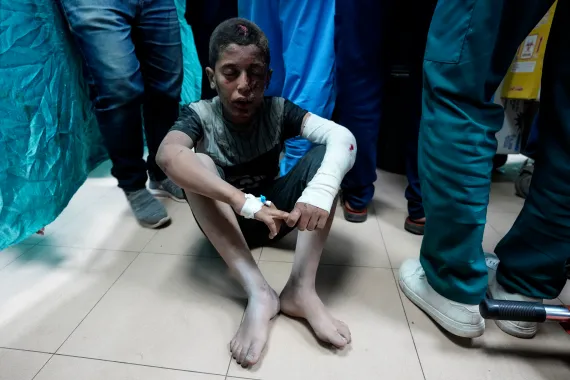
In a devastating escalation of violence, Israeli forces bombed a tent camp housing displaced people in Rafah, resulting in the deaths of approximately 40 Palestinians, according to the Wafa news agency. This tragic incident occurred in a designated safe zone, intensifying the humanitarian crisis in Gaza. Among the victims were many women and children, highlighting the dire consequences of the ongoing conflict.
The attack on the camp in Tal as-Sultan, Rafah, is part of a broader campaign by Israeli forces targeting various areas across Gaza. Palestinian officials report that in addition to Rafah, shelters housing displaced Palestinians in Jabalia, Nuseirat, and Gaza City were also bombed. These attacks have collectively killed at least 160 Palestinians. The increasing number of casualties has sparked international outrage and calls for immediate intervention to protect civilians.
The Israeli military confirmed the bombing of the Rafah camp, stating that the operation targeted Hamas fighters. The military emphasized the use of "precision weaponry" but acknowledged that civilians were injured when a fire broke out following the attack. The incident is currently under investigation, as the military seeks to address the consequences of its actions.
Since the onset of the conflict on October 7, the scale of devastation in Gaza has been unprecedented. According to Palestinian health officials, at least 35,984 Palestinians have been killed, and up to 80,643 people have been wounded. These staggering figures reflect the intensity of the Israeli military operations and the severe impact on the civilian population.
The conflict was ignited by a significant attack by Hamas on October 7, which resulted in the deaths of 1,139 Israelis. In addition, dozens of individuals were taken captive, further escalating tensions and prompting a robust military response from Israel. The ongoing hostilities have exacerbated the already dire humanitarian situation in Gaza, with many areas experiencing shortages of essential supplies, including food, water, and medical aid.
International reactions to the conflict have been varied. While some countries and organizations have called for immediate ceasefire and humanitarian assistance, others have supported Israel's right to defend itself against Hamas. The complex geopolitical landscape has made it challenging to achieve a consensus on how to address the crisis effectively.
Human rights organizations have expressed grave concerns over the high civilian toll in Gaza. They have called for thorough investigations into the attacks and for measures to protect civilians from further harm. The bombings of shelters and designated safe zones, such as the camp in Rafah, have raised critical questions about the adherence to international humanitarian law and the protection of non-combatants in conflict zones.
As the conflict continues, the people of Gaza face immense suffering and uncertainty. The international community's role in facilitating a resolution to the violence and providing humanitarian aid remains crucial. The latest incidents, including the tragic attack on the Rafah camp, underscore the urgent need for a comprehensive and sustained effort to bring peace and stability to the region.











